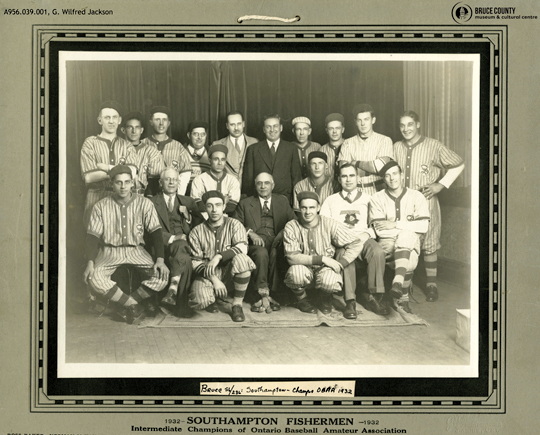Our story starts in the “Dirty Thirties,” when factories closed, summer visitors dwindled, and the lamprey eel was the bane of fishermen.
Luckily Southampton had a first-class hardball baseball team to distract from the hardships of the Depression. Since the fishing tradition was so strong, the team was named the Southampton Fishermen.
Formed about 1930, the mighty Fishermen belonged to the Ontario Baseball Association Intermediate B Division. They competed in the Grey-Bruce Intermediate League, which included teams from Port Elgin, Paisley, Walkerton, Teeswater, Harriston and Owen Sound.
From 1931 to 1935 Southampton won the Grey-Bruce League championship each year and twice took the Intermediate B Provincial Championship, in 1932 and 1933. They capped their winning streak with an Intermediate A Championship in 1935. The Fishermen chalked up playoff victories against teams like Napanee, Picton, Milton, Strathroy and Windsor.
The driving force behind the team, the honorary president and the man with the money, was A. Fred Bowman (1865-1945), Southampton’s only known millionaire. The president was bank manager John B. Clark. Team manager was Doc Morton and Roney Spencer was coach.
The team came from near and far and included Alf Brown, centre fielder, Harold (Lindy) Indoe, right field, and Bert (Dudey) Kugler, left field. Ross Baker covered shortstop while John Wain was catcher. Who’s on first? —Ernest (Curley) Aitken. On second, Clarence Schilling, who stepped aside for Harvey Krueger when he injured his throwing arm; and on third, Norman MacKay.
Star of the team was southpaw pitcher Hector “Hec” Goldsmith, who moved his family to Southampton from Thornbury. They say he could have made the majors—he had tryouts—but preferred the quieter life in these parts. He was known for his wicked curve ball and a fastball which seemed to hop up as it reached the batter.

View from atop the water tower shows the crowds at Victoria Park, Sept. 3, 1934. (Bruce County Museum & Cultural Centre, A981.017.001)
The team couldn’t have achieved its success without the financial backing of Fred Bowman. Yet the fates did not reward him one particular day, when he was hit in the eye by a foul ball, seriously damaging his sight. But there were no hard feelings—Mr. Bowman still supported the team afterward. He was a director of McIntyre Mines and paid for trips to North Bay and Timmins for exhibition games.
During the team’s first game against Teeswater the Fishermen went into extra innings with no score. Pitcher Hec Goldsmith must have wanted the game over because on his last at bat, he hit a home run into the adjacent orchard, winning the game. He was an instant hero in Southampton.
Baseball fever peaked at the playoffs. It cost 25 cents to get in but even so thousands packed Victoria Park (now Jubilee Park) by the fifth inning. Many more got in free through a hole in the fence at the southwest corner of the park.
Businesses closed for big games and High Street was deserted. In fact, one store was robbed during a game.
Back then, big league baseball often had professional comedians to entertain before the game and during pauses in play. The Fishermen had Dalton “Dot” Shular, a well-known Southampton character who sported parts of the team uniform and wowed the crowd by running the bases and sliding into home in a great cloud of dust.
Here’s a tip. Has heavy rain turned the clay infield into a soft and sticky mess? Dump 90 gallons of gasoline on it, step back and throw a lit match. When the 100-foot-high flames die down, you’re left with a perfectly baked clay surface. After that flaming treatment, the Fishermen won the game, naturally.
The heyday of the Fishermen was short but provided welcome relief from the hard times of the Depression years.



